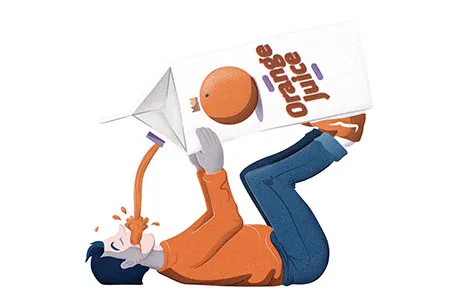The amount of sugars in fruit juice can be equivalent to, or even higher than, that found in fizzy drinks. That’s bad news – too much sugar puts us at risk of health problems including obesity and type 2 diabetes, as well as tooth decay. With research highlighting these potential health risks, and public awareness increasing, the reputation and popularity of fruit juice have fallen in recent years.

It’s not all bad news. Pure fruit juice does contain vitamins, minerals and antioxidants, which are not generally found in fizzy drinks, and these can boost the immune system and help ward off infection and inflammation. So fruit juices are marginally better for you than fizzy drinks. But no matter how much juice you glug down, it’ll still only count as one of your recommended five-a-day. This is because when fruit is juiced, sugar is released from the fruit’s cells as ‘free sugars’, and most of the fibre is removed – both of which mean that juice isn’t as good for you as the whole fruit.
If you do need a fruit juice hit, the NHS recommends no more than 150ml a day, and drinking with meals to reduce tooth damage. You could also dilute your juices to reduce the proportion of sugar – and this will make them last for longer, too!
Read more:
- Does the carbon dioxide released from fizzy drinks affect the atmosphere?
- How many Fruit Pastilles would you need to eat to get one of your five-a-day?
- Why do some drinks taste better when they are cold?
- Is it possible to drink too much tea?

